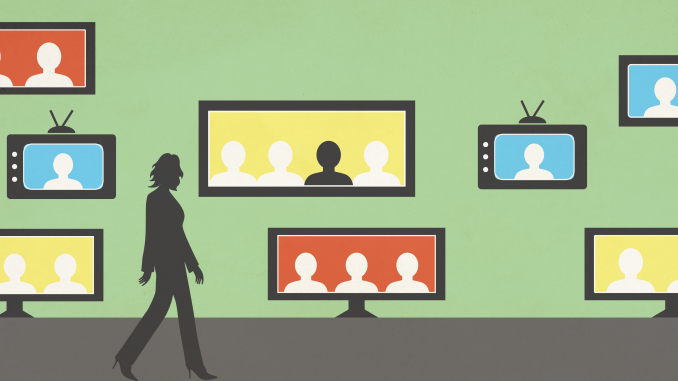
At one point in my life, I couldn’t live without television, but it was doing just fine without me.
From fifth to seventh grade, I ran the mile home from my bus stop to watch my favorite show. I ripped off my school uniform as fast as I could, put on my comfy clothes — a baggy T-shirt and shorts, sat on the couch in my living room and turned on “Everybody Hates Chris.” The only channel that consistently ran my show was BET, the Black Entertainment Television channel.
I didn’t mind that my only preferred channel was BET. It was the channel where I would get all of my favorite entertainment, like “My Wife and Kids,” “The Game,” “The Parkers,” “Martin” and more. But I felt like I shouldn’t have had to rely on that specific channel to see people who looked like me.
There came a certain point when coming home after a stressful day of school, with the TV already on Freeform or CNN, I didn’t want to have to turn to BET for a program I’d actually find relatable.
I soon figured out that TV isn’t an even playing field. I was lucky to see even a sprinkle of chocolate mixed in with all the vanilla, unless I was watching BET.
Eventually, I stopped watching my “Everybody Hates Chris.” This was the show that helped me connect with my siblings and classmates. I even made most of my middle school friends through a mutual admiration for the show.
I stopped watching my favorite show, as I grew older. I began to feel embarrassed for not watching the “popular” shows that everyone was watching, like “The Vampire Diaries.”
Not watching “Everybody Hates Chris” didn’t mean I stopped watching TV, though. If anything, I did the exact opposite and began watching even more because I discovered the ease of streaming shows.
As soon as I started streaming shows on Netflix instead of watching cable, I saw why my generation was so obsessed with the concept. I noticed a change right away. I became even more of a TV fanatic. But I didn’t notice right away that I was consuming more white media and less Black media.
Bonnie Bennett, the only Black main character on “The Vampire Diaries,” catered to the needs of her white counterparts. Missandei and Grey Worm of “Game of Thrones” are Daenerys Targaryen’s servants. I can’t call this fair representation.
Shows with token Black characters like these are sending a message to viewers that there are Black people in the world, but they are not the main characters. Black stories are not important unless they are in conjunction with those of white people.
I wanted to see self-sufficient, tenacious Black leading roles that take the spotlight themselves — not ones that only complimented white characters or made the show seem more diverse on the surface.
This sudden epiphany made me angry at first. I even thought about boycotting TV. But doing so would only prevent me from enjoying something that I’ve always loved and found soothing.
My friends seemed to be happy with what they were getting from Netflix, and I decided I needed to find programs on the streaming service that would make me happy too.
I found a plethora of Netflix shows that relate to me, like “On My Block,” a comedy that focuses on a diverse group of street-smart kids in Los Angeles. Shows like this don’t just have Black characters; they have Black characters of substance. And a series like “Dear White People,” which addresses the adversity of students of marginalized identities at a predominantly white Ivy League college, creates meaningful discussions. It feels genuine, not forced.
I want to see a diverse range of Black women on TV and not just the Cookie Lyons. Like white women, Black women can be strong and brave, young and old, delicate and dainty, outspoken and soft spoken.
The truth is, TV shows cannot legitimately succeed without reflecting the world we live in — which includes people like me: Black people. And when I find myself giving up on the exclusivity of mainstream channels, I turn to streaming services like Netflix and watch whichever programs make me feel like the main character.



Be the first to comment